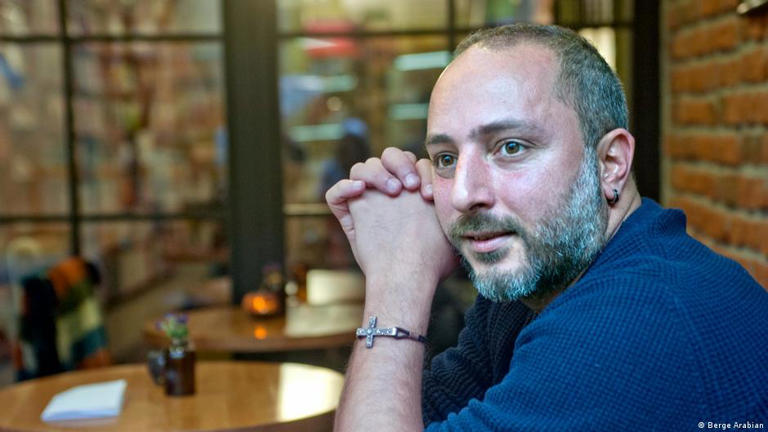Does Erdogan’s defeat signal hope for Turkish diaspora?
The recent electoral defeat for the president’s party has sparked joy within the opposition and inspired hope among Turks who have emigrated abroad. But is this hope strong enough to persuade them to return?

Turkey’s streets were filled with people celebrating after the opposition’s victory on March 31© Khalil Hamra/dpa/AP/picture alliance
The political landscape in Turkey experienced a significant shift as President Recep Tayyip Erdogan’s conservative Justice and Development Party (AKP), suffered a historic defeat in last week’s local elections.
The center-left Republican People’s Party (CHP) celebrated a resounding victory that echoed throughout the nation, as it secured wins in 21 smaller municipalities and claimed victory in 14 major cities, including the crucial centers of Istanbul, Ankara, and Izmir.
The victory has revived hopes among the opposition, which was deeply disappointed by Erdogan’s reelection victory in last year’s general elections. The streets were filled with people celebrating and cheering for the first time in a long time.
CHP leader Ozgur Ozel said in his victory speech that “young people who had packed their suitcases in their minds decided to wait for another election with this victory.”
Ozel’s acknowledgment of these young people in his speech before the enthusiastic crowd in the Turkish capital, Ankara, is not without reason. Turkey recently experienced the largest wave of brain drain in its modern history, with young individuals disillusioned by 22 years of conservative governance opting to relocate to countries where they perceive greater economic and political stability.
But could this victory, coming after so many years, be a glimmer of hope for these young people to return home?
Related video: Turkiye reinstates pro-Kurdish mayor (WION)
Turkish expats in Europe balance hope, reality
Ozgecan Ozeren, 35, who relocated to Germany three years ago, one of the most popular destinations for Turkish expats, finds the election results encouraging but not sufficient.
Ozeren, who works as a marketing manager for a German company, explains that she moved to Germany with the aspiration of attaining a higher standard of living, achieving a better work-life balance, reducing stress, and alleviating concerns about the future. She said the recent elections were something she had been hoping for over the past 22 years.
“Despite my relocation, I’ve always carried concerns for my loved ones who still reside in Turkey, given the challenging circumstances there. Consequently, the overwhelming sense of relief and hope I felt for my country was immense,” she said. Yet, Ozeren added that the elections didn’t significantly alter her mid-term plans regarding a potential return to her home country. “The impact of the last 22 years will undoubtedly take time to address and overcome.”

Ozgecan Ozeren is hopeful after the opposition’s victory, but she does not plan to return to her home country for now© Privat
Esra Ogun, a technology specialist in the research and development department of a multinational company in Frankfurt, shares a similar sentiment. The 35-year-old, who has been living in Germany since 2014, reflected on her electoral experiences in Germany with disappointment. She said the celebrations among German-Turks after Erdogan’s victories have been more disheartening than what she witnessed in Turkey.
“The celebrations that lasted until midnight with honking horns after every election, the cheers we had to witness in front of the Turkish consulate while voting, and our hopes of returning to Turkey fading away little by little…”
Although the recent elections have sparked a glimmer of hope for Ogun, she said the working environment in Germany is more suitable for her and that she has no plans to return to Turkey until retirement.

Esra Ogun said Germany has become the new Turkey for young expats© Privat
The growth of the Turkish diaspora in Germany in recent years and the atmosphere of solidarity have been other important factors connecting Ogun to her current home. She said when she first arrived in Frankfurt, she had only one Turkish friend, but now she is surrounded by dozens of Turkish people from various professions.
Describing her circle as “people who want a peaceful life away from oppression,” she added, “It is as if Germany has suddenly become the new Turkey for us.”
Onur Keskin, a product safety test engineer based in the UK, maintained a notably neutral stance regarding the recent election outcomes, signaling his intent to remain abroad indefinitely. He summarized his reasons for relocating as “not being valued enough in business life in Turkey, the imbalance and stress in the daily flow of life, the lawless environment, anxiety about the future, social and economic insecurity.”
“While the government is often identified as the root cause of these issues, I don’t believe the current ruling regime’s loss of power will be the solution,” said Keskin, highlighting the deeply entrenched nature of the current challenges.
“The pervasive problem here is that people have lost their sense of justice. When deciding whether something is right or not and forming an opinion, they look at who the subject of the event is rather than the event itself. Intolerance is reflected everywhere, from children’s behavior towards each other to traffic, from the street to the work environment.”
Voice of resilience amid political challenges
For many Turkish expatriates who have recently relocated to Europe, returning home is, at the very least, still a possibility. However, for opposition figures like Turkish-Armenian journalist Hayko Bagdat, the prospect presents significantly greater challenges. It will take much more than an election victory for Bagdat to risk a return.
On trial for insulting President Erdogan, Bagdat faces a 10-year prison sentence in the country he left behind. He has denied the charges filed against him, which are based on some of his social media posts and columns.

Bagdat holds out hope for transformative change in Turkey.© Berge Arabian
When asked about the latest elections, Bagdat said he has already lost hope for Turkey regarding the Armenian genocide recognition along with the security and well-being of the minority.
“If you ask me as an Armenian,” he said, “there is not much to get excited about.” But then, his voice gained a spark of strength. “But of course I am not only Armenian. I am a part of the common great joy of millions of people in Turkey: children, our friends in prison, our colleagues, women, Kurds…”
Bagdat, who relocated to Berlin in 2017 amid mounting pressure and threats in Turkey, has found solidarity in a growing community of opposition artists, intellectuals and journalists now residing in the German capital. Among them are those who have harbored hopes of a change in government with each Turkish election cycle.
In past elections, Bagdat even jokingly criticized those who prematurely packed their suitcases. However, this time, he acknowledged a distinct shift in his perspective.
“This time we are no longer making fun of being hopeful,” he said. “We are all on the same page. It’s still too early to pack our bags, but we share a collective sense of hope. It is not a naive and wistful sentiment fueled by nostalgia, but rather one imbued with courage. We are aware that challenging times lie ahead, yet we are driven to equip ourselves, strategize, and act accordingly.”
Edited by: Martin Kuebler
Author: Sinem Özdemir


